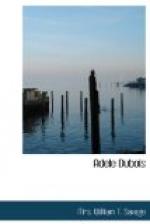“Miss Ady didn’t say I could help ye neow, did she?” said Micah, scratching his head.
“Certainly. Why did she bring me here?”
“Well, ef that aint tarnal queer”, said Micah, falling into a deep reverie.
In a few moments, Mr. Norton shook his new acquaintance heartily by the hand and bade him good morning. Was the good man discouraged in his efforts? By no means.
He had placed in the mind of Micah Mummychog a small fusee, so to speak, which he foresaw would fire a whole train of discarded ideas and cast-off thoughts, and he expected to hear from it.
He filled up the day with a round of calls upon the various families of the neighborhood, and came home to his lodgings at Mr. Dubois’s with his heart overwhelmed by the ignorance and debasement he had witnessed.
Yet his courage and hopes were strong.
CHAPTER V.
Mrs. Lansdowne.
P—— is a city by the sea. Built upon an elevated peninsula, surrounded by a country of manifold resources of beauty and fertility, with a fine, broad harbor, it sits queenlike in conscious power, facing with serene aspect the ever-restless waves that wash continually its feet. The place might be called ancient, if that term could properly be applied to any of the works of man on New England shores. There are parts of it, where the architecture of whole streets looks quaint and time-worn; here and there a few antique churches appear, but modern structures predominate, and the place is full of vigorous life and industry.
It was sunset. The sky was suffused with the richest carmine. The waters lay quivering beneath the palpitating, rosy light. The spires and domes of the town caught the ethereal hues and the emerald hills were bathed in the glowing atmosphere.
In a large apartment, in the second story of a tall, brick mansion on —— street, sat Mrs. Lansdowne. Susceptible though she was to the attractions of the scene before her, they did not now occupy her attention. Her brow was contracted with painful thought, her lip quivered with deep emotion. The greatest sorrow she had known had fallen upon her through the error of one whom she fondly loved.
Though enwrapped in a cloud of grief, one could see that she possessed beauty of a rich and rare type. She had the delicate, aquiline nose, the dark, lustrous eyes and hair, the finely arched eyebrows of the Hebrew woman. But she was no Jewess.
Mrs. Lansdowne could number in her ancestry men who had been notable leaders in the Revolutionary war with England, and, later in our history, others, who were remarkable for patriotism, nobility of character, intellectual ability, and high moral and religious culture.
Early in life, she had been united to Mr. Lansdowne, a gentleman moving in the same rank of society with herself. His health obliged him to give up the professional life he anticipated, and he had become a prosperous and enterprising merchant in his native city. They had an only child, a son eighteen years old, who in the progress of his collegiate course had just entered the senior year.




